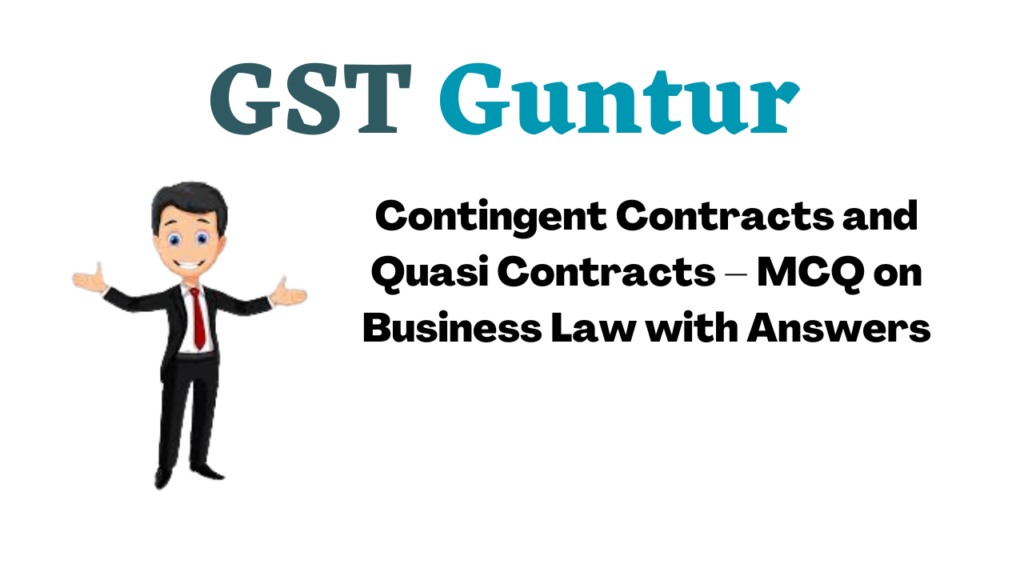Students should practice Contingent Contracts and Quasi Contracts – CA Foundation Business Law MCQ Questions with Answers based on the latest syllabus.
Contingent Contracts and Quasi Contracts – Business Law MCQ Questions with Answers
1. A makes a contract with B to buy B’s horse if A survives C. This is _________.
(a) a Quasi-contract
(b) a Void contract
(c) a Contingent contract
(d) a Conditional contract
Answer:
(c) a Contingent contract
2. An insurance contract is _________.
(a) Contingent contract
(b) Wagering agreement
(c) Unenforceable contract
(d) Void contract
Answer:
(a) Contingent contract
3. If the contingent depends on the mere will of the promisor it would be _________.
(a) Valid
(b) Void
(c) Illegal
(d) Depends on the circumstances
Answer:
(b) Void
4. A contract of life insurance, the performance of which depends upon a future event falls under the category of _________.
(a) Contract of Indemnity
(b) Contract of Guarantee
(c) Contingent Contract
(d) Special type of Contract
Answer:
(c) Contingent Contract
![]()
5. Which one of the following is not an essential feature of a wagering agreement?
(a) Insurable interest
(b) Uncertain event
(c) Mutual chances of gain or loss
(d) Neither party to have control over the event
Answer:
(a) Insurable interest
6. The contingent contract dependent on the happening of the future uncertain event can be enforced when such event:
(a) Happens
(b) Does not happen
(c) Does not become a impossible
(d) Both (a) & (c)
Answer:
(a) Happens
7. Contract contingent upon the happening of a future uncertain event becomes void.
(a) If the event becomes impossible
(b) If the event happens
(c) If the event does not happen
(d) None of the above.
Answer:
(a) If the event becomes impossible
8. Contracts contingent upon the non-happening of the future uncertain event becomes void when such event:
(a) Happen
(b) Does not happen
(c) The event becomes impossible
(d) None of the above
Answer:
(a) Happen
9. Contract contingent upon the non-happening of the future uncertain event becomes enforceable _________.
(a) When the happening of that event becomes impossible and not before
(b) When the happening of that event becomes possible and not before
(c) When the event happens
(d) None of the above.
Answer:
(a) When the happening of that event becomes impossible and not before
10. A promises to pay B a sum of money if a certain ship does not return within a year. The ship is sunk within a year. The contract is _________.
(a) Enforceable
(b) Void
(c) Voidable
(d) Illegal
Answer:
(a) Enforceable
![]()
11. Contingent contract to do or not to do anything, if an impossible event happens are:
(a) Valid
(b) Void
(c) Voidable
(d) Illegal
Answer:
(b) Void
12. Contingent contract dependent on the non-happening of the event within a fixed time can be enforced, if the event:
(a) Does not happen within the fixed time
(b) Before the time fixed such event becomes impossible
(c) Both(a)&(b)
(d) None of the above
Answer:
(c) Both(a)&(b)
13. In a contingent contract which event is contingent _________.
(a) Main event
(b) Collateral event
(c) Both (a) & (b)
(d) None of the above.
Answer:
(b) Collateral event
14. Under section 70 of the Indian Contract Act, 1872, if a person who enjoys the benefit of any other person’s work, the beneficiary must pay to the benefactor for the services rendered, provided the intention of the benefactor was:
(a) Gratuitous
(b) Non-gratuitous
(c) To create legal relations
(d) None of these
Answer:
(b) Non-gratuitous
15. A finder of goods can:
(a) file a suit to recover his expenses,
(b) sell the goods if he likes
(c) can sue for a reward, if any
(d) None of the above
Answer:
(c) can sue for a reward, if any
16. A finder of goods can sell the goods if the cost of finding the true owner exceeds:
(a) 1/4 of the value of the goods
(b) 1 /3 of the value of the goods
(c) 1 / 2 of the value of the goods
(d) 2/3 of the value of the goods
Answer:
(d) 2/3 of the value of the goods
17. The contract uberrimae fidei means a contract _________.
(a) Of goodwill
(b) Guaranteed by a surety
(c) Of utmost good faith
(d) Of good faith
Answer:
(c) Of utmost good faith
18. A finder can sell the goods if:
(a) the goods are ascertained
(b) the goods are un-ascertained
(c) the goods are valuable
(d) the goods are perishable.
Answer:
(d) the goods are perishable.
![]()
State Whether The Following Are True or False:
- The event in a contingent contract may be certain or uncertain.
- A contract of insurance is not a contingent contract.
- A wagering agreement is a contingent contract.
- Contracts of indemnity are contingent contracts.
- Contracts contingent upon the happening of an uncertain specified event within a fixed time can become void only after the expiry of the fixed time.
- A finder of goods can sue the true owner for recovery of expenses incurred for the safety of the goods.
- Any person making payment for another can get reimbursement from the person for whom he has paid.
- A person supplying articles of the necessities to the wife of a lunatic is entitled for reimbursement from the property of the lunatic.
- A person cannot recover from another an amount paid under a mistake of law.
- A person who enjoys the benefit of a non-gratuitous act is bound to make compensation.
- A finder of lost goods is a bailee.
- In Quasi-contract the promise to pay is always an implication of law and not of facts.
Answer:
- False
- False
- False
- True
- False
- False
- True
- True
- False
- True
- True
- True
